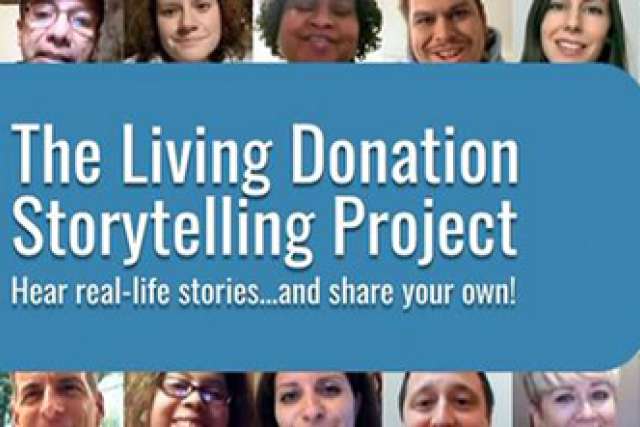The Transplant Research and Education Center (TREC) at UCLA will launch the Living Donation Storytelling Project, a unique digital library of stories of people sharing their real experiences as living donors, recipients of living donor kidney transplants, and those in need of transplants. The launch of this pioneering health education tool coincides with National Donate Life (Blue & Green) Day, as part of a comprehensive campaign to raise awareness of kidney disease and make it easy for anyone to learn and share about living donation. The digital library, including hundreds of stories, goes live on April 12, 2019 at explorelivingdonation.org.
Nearly 15 percent of the US population is affected by some stage of kidney disease. Compared to remaining on dialysis, a kidney transplant from a living donor can greatly improve health and extend life expectancy. There is a kidney donor shortage; 95,000 Americans remain on the wait list for transplant while annual kidney donations meet only 5 percent of that need. One challenge in the field of renal transplant is how best to educate and improve access to living donor kidney transplant among minority populations disproportionately affected by kidney disease. TREC’s mission is to increase public awareness of kidney disease and its treatment options, reduce barriers to living donation, and reduce the racial and socio-economic disparities in transplant access.
A large and growing body of research concludes that the sharing of "narratives" is an effective tool for promoting health education for new learners. To that end, the Living Donation Storytelling Project, led by Amy Waterman, a leading expert in transplant research and education, strives to provide authentic and relatable education through capturing digital personal narratives for dissemination using social media. Waterman's lab is exploring whether these narratives may be more effective and memorable than traditional health communications for some audiences.
"People have a lot of questions about living kidney donation since it involves two people, one donating a kidney to another," said Waterman, director of the Transplant and Research Education Center at Terasaki Research Institute and professor in residence of medicine, division of Nephrology, at the David Geffen School of Medicine at UCLA. "It's often better to learn from others who have gone through it personally."
"We want everyone to see themselves represented in this library," she added.
The technology behind the library empowers participants to record their story anywhere, anytime, on any smartphone, tablet, or laptop. Open-ended prompts guide storytellers to discuss different topics of their choice. Upon conclusion, the video segments automatically stitch together into one seamless story. Kidney patients can post their stories on social media to share their need for a kidney with their own communities.
The digital storytelling platform has already collected more than 100 stories from living donors, recipients and allies, including those exploring the idea of donation, and some looking for a living donor. Storytellers come from diverse racial and ethnic backgrounds, geographic regions, ages, genders, and life experiences. The library will continue to grow over time. By sharing their candid personal stories, they each help to raise awareness about the need for living donors:
The Storytelling Library serves as an introduction for those who have never have heard of living donation, providing a gateway to a full suite of educational resources available on www.exploretransplant.org. The Storytelling Library is also a tool that can be used by dialysis centers and transplant programs to enhance their educational offerings.



